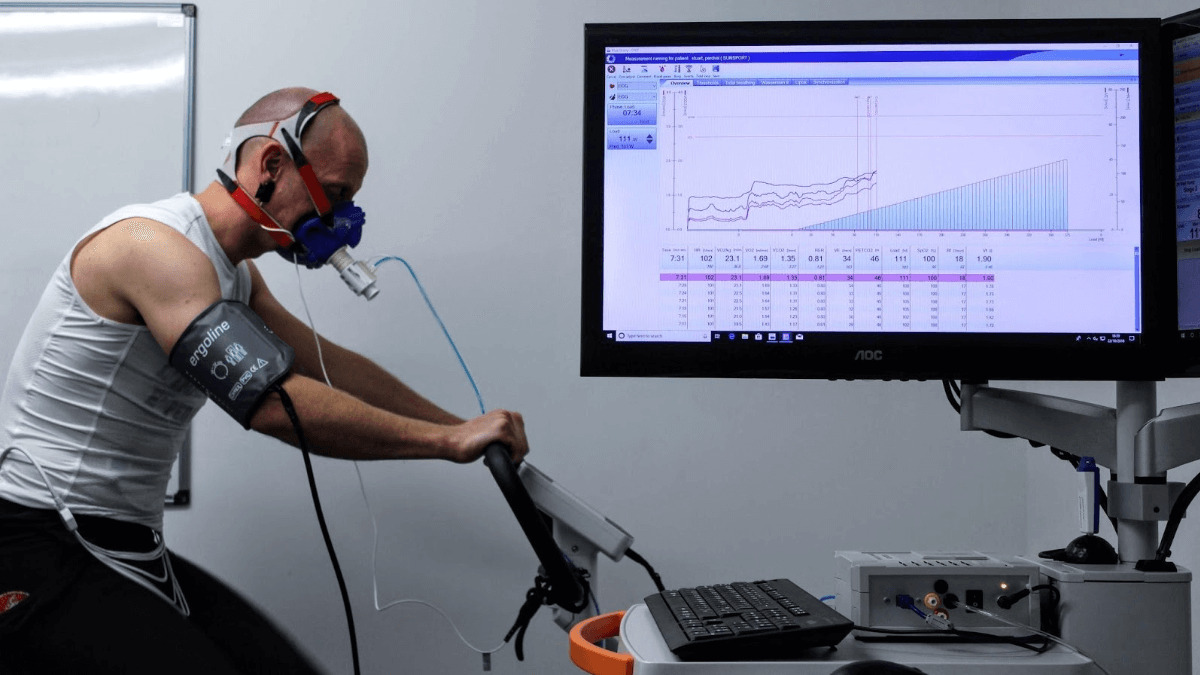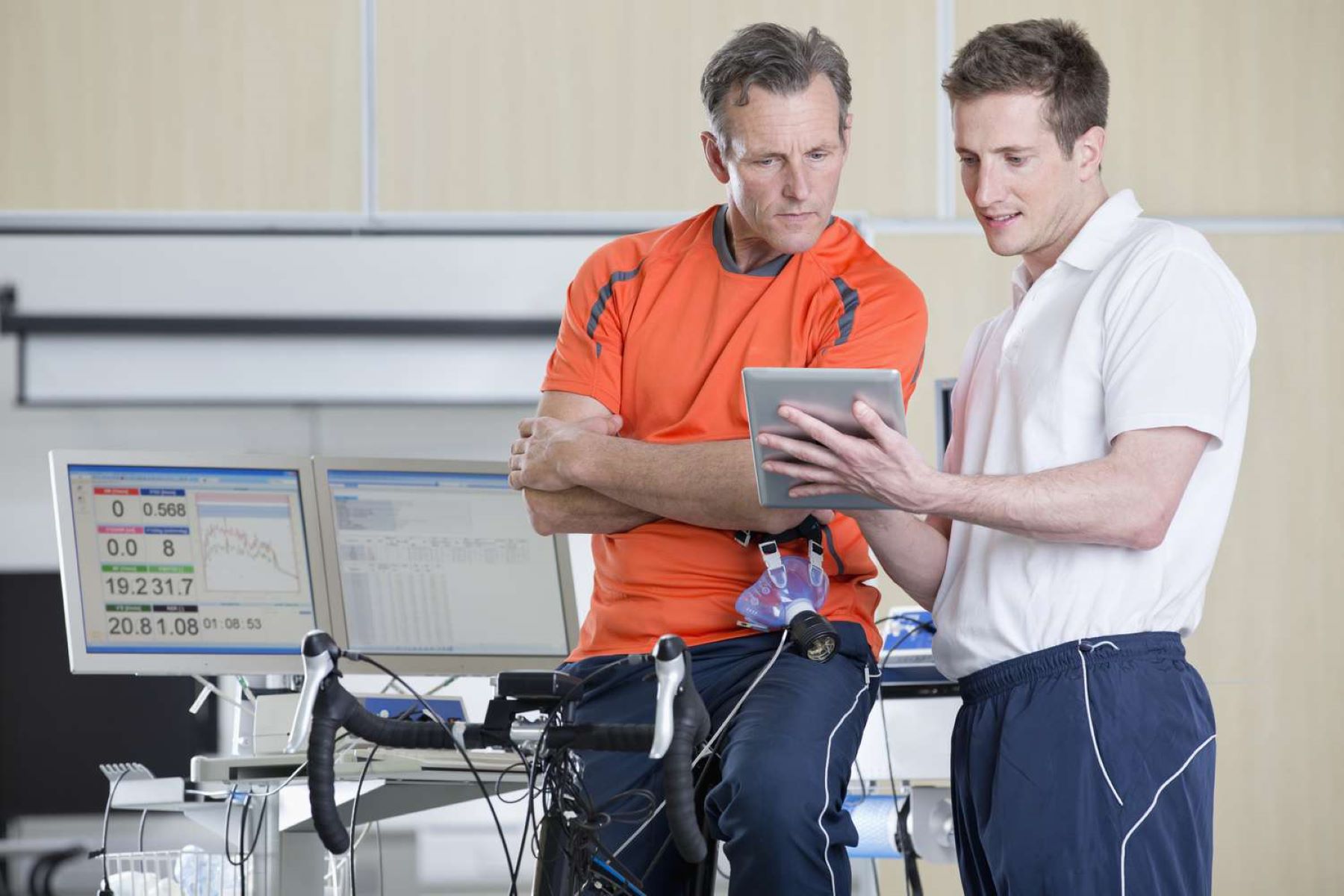Home>Misc>Featured>Which Tests Measure Cardiovascular Fitness?


Featured
Which Tests Measure Cardiovascular Fitness?
Modified: January 22, 2024
Discover the top tests used to assess cardiovascular fitness in this featured article. Learn how to measure your heart health and improve your overall endurance.
Introduction
Cardiovascular fitness is a crucial aspect of overall health and well-being. It refers to the ability of the heart, lungs, and circulatory system to efficiently deliver oxygen and nutrients to the muscles during physical activity. Regular cardiovascular exercise not only improves heart health but also helps to manage weight, boost energy levels, reduce the risk of chronic diseases, and improve overall quality of life.
When it comes to assessing and measuring cardiovascular fitness, there are several tests that can provide valuable insights. These tests evaluate various parameters such as heart rate, oxygen consumption, endurance, and overall exercise capacity. By understanding the different tests available, individuals can determine the most appropriate method for assessing their cardiovascular fitness.
In this article, we will explore some of the most commonly used tests to measure cardiovascular fitness. It is important to note that these tests should ideally be conducted under the supervision of a trained professional, such as a fitness instructor or healthcare provider, to ensure accuracy and safety.
By undergoing these tests, individuals can gain a better understanding of their current fitness level and set achievable goals to improve their cardiovascular health. So, let’s dive into the different tests used to measure cardiovascular fitness and explore their benefits and limitations.
Treadmill Stress Test
The treadmill stress test, also known as the exercise stress test or graded exercise test, is a widely used method to evaluate cardiovascular fitness. It involves walking or running on a treadmill while your heart rate, blood pressure, and electrocardiogram (ECG) are monitored.
This test is done to assess how well your body can handle physical activity and to detect any underlying cardiovascular conditions. It is often used to evaluate individuals with known heart problems or those who are at high risk for developing heart disease.
During the treadmill stress test, you will start by walking at a slow pace on the treadmill. The speed and incline gradually increase to stimulate the heart and simulate a more challenging exercise. The test continues until you reach your target heart rate or until you are unable to continue due to fatigue or other symptoms.
The treadmill stress test provides valuable information about your heart’s response to physical exertion. It can help identify any abnormal heart rhythms, inadequate blood flow to the heart, or signs of heart disease. In addition, it can help determine your exercise tolerance and set appropriate exercise intensity levels.
It is important to note that the treadmill stress test should be conducted under the supervision of a healthcare professional who can closely monitor your vital signs throughout the test. This ensures safety and accurate interpretation of the results.
Overall, the treadmill stress test is a valuable tool for assessing cardiovascular fitness, identifying potential heart problems, and guiding exercise prescription. If you have any concerns about your cardiovascular health or want to understand your fitness level, consult with your healthcare provider to determine if a treadmill stress test is appropriate for you.
VO2 Max Test
The VO2 max test, also known as the maximal oxygen consumption test, is considered the gold standard for measuring cardiovascular fitness. It assesses the maximum amount of oxygen that an individual can utilize during intense exercise, indicating their overall aerobic capacity.
This test is typically performed in a laboratory setting, using specialized equipment such as a treadmill or stationary bike, along with a breathing mask to measure oxygen and carbon dioxide levels. During the test, the intensity gradually increases, and the individual is required to perform at their maximum effort until exhaustion.
Why is VO2 max important? A higher VO2 max indicates a more efficient cardiovascular system and better endurance capacity. It is a strong predictor of an individual’s cardiovascular fitness level and performance potential in endurance activities such as running, cycling, and swimming.
In addition to assessing cardiovascular fitness, the VO2 max test can be used to determine personalized heart rate training zones, which optimize the efficiency and effectiveness of exercise programs. By training within these zones, individuals can target specific intensities to improve their aerobic capacity and enhance overall performance.
It’s worth noting that the VO2 max test requires professional supervision and should only be performed by those who are in good overall health and have a solid fitness base. Individuals with certain medical conditions or limitations may not be suitable candidates for this test.
Overall, the VO2 max test provides valuable information about an individual’s cardiovascular fitness and can serve as a benchmark for monitoring progress over time. Whether you are an elite athlete or a recreational fitness enthusiast, understanding your VO2 max can help tailor your training programs and optimize your performance in endurance activities.
6-Minute Walk Test
The 6-minute walk test is a simple yet effective method to evaluate cardiovascular fitness and endurance. It measures how far an individual can walk in 6 minutes, providing an estimate of their aerobic capacity and overall functional ability.
This test is typically performed in a controlled environment such as a hallway or a track, where the individual walks as fast as they can for a duration of 6 minutes. During the test, the distance covered is measured, and various vitals, such as heart rate and blood pressure, may also be monitored.
The 6-minute walk test is often used in clinical settings to assess the functional capacity of individuals with cardiac or pulmonary conditions. It can help determine their exercise tolerance, identify any limitations, and monitor the effectiveness of treatment interventions.
This test is also used in research studies and can be valuable for individuals who want to assess their overall cardiovascular fitness in a practical and accessible way. It provides a baseline measurement that can be used to track progress and set realistic goals for improvement.
It is important to note that the 6-minute walk test is relatively safe and well-tolerated by most individuals. However, it should still be performed under the supervision of a qualified healthcare professional, particularly if you have any underlying health concerns.
If you are considering the 6-minute walk test, it is recommended to wear comfortable clothing and footwear to ensure optimal performance. Additionally, make sure to warm up adequately before the test and pace yourself throughout the 6 minutes to maintain a steady but challenging effort.
Overall, the 6-minute walk test provides a practical and accessible means to evaluate cardiovascular fitness and endurance. Whether used in a clinical setting or for personal assessment, this test offers valuable insights into an individual’s functional capacity and can guide exercise prescription and goal-setting.
Step Test
The step test, also known as the Harvard Step Test, is a simple and effective cardiovascular fitness test that measures an individual’s recovery heart rate after physical exertion. It provides a quick assessment of aerobic fitness and can be performed in a variety of settings.
During the step test, individuals step up and down on a platform or a step bench at a fixed rate for a specific duration, typically three minutes. The height of the step and the stepping rate depend on the individual’s age and fitness level. After completing the exercise, the individual’s heart rate is immediately measured and recorded.
The step test is designed to challenge the cardiovascular system and elevate heart rate. The recovery heart rate is then measured at specific time intervals, such as one minute, two minutes, and three minutes after the exercise. The rate at which the heart rate returns to its resting level indicates the efficiency of cardiovascular recovery and reflects the individual’s aerobic fitness level.
This test is particularly useful for individuals who are new to fitness or those who prefer low-impact activities. It does not require specialized equipment or a large space, making it easily accessible and suitable for various age groups.
It’s important to remember that the step test should be performed under the guidance of a qualified fitness instructor or healthcare professional to ensure safety and accurate interpretation of the results. They can provide guidance on proper stepping technique, stepping rate, and monitoring heart rate effectively.
Overall, the step test is a practical and convenient method to assess cardiovascular fitness and recovery. By measuring the recovery heart rate, it provides insights into an individual’s aerobic capacity and their body’s ability to efficiently recover after exercise. If you are looking for a simple way to assess your cardiovascular fitness, the step test is a great option to consider.
Bicycle Ergometer Test
The bicycle ergometer test, also known as the stationary bike test, is a popular method used to evaluate cardiovascular fitness and endurance. It involves pedaling on a stationary bike at gradually increasing intensities while monitoring heart rate, oxygen consumption, and other physiological responses.
This test can be performed using different protocols, such as the Bruce Protocol or the Astrand-Rhyming Test, which determine the rate at which intensity increases. The individual’s heart rate, blood pressure, and oxygen consumption are measured at various stages of the test to assess their aerobic capacity and cardiovascular response.
The bicycle ergometer test is beneficial for several reasons. It provides a controlled and consistent environment for testing, making it easier to compare results between individuals and track progress over time. Additionally, it allows for accurate monitoring of physiological parameters, such as heart rate and oxygen consumption, which are crucial in assessing cardiovascular fitness.
This test is often used in research studies and clinical settings to evaluate individuals with cardiovascular conditions or athletes preparing for high-intensity sports. It provides valuable information about an individual’s aerobic capacity, overall fitness level, and the ability of their cardiovascular system to adapt and respond to exercise stress.
It is important to conduct the bicycle ergometer test under the supervision of a qualified fitness professional or healthcare provider who can ensure safety and accuracy. They will guide you on setting the appropriate workload, monitoring your vital signs, and interpreting the results.
The bicycle ergometer test offers a comprehensive evaluation of cardiovascular fitness, allowing individuals to identify their aerobic capacity and make informed decisions about their exercise routines. If you are looking for a challenging and effective way to assess your cardiovascular fitness, the bicycle ergometer test may be a suitable option for you.
1-Mile Walk Test
The 1-Mile Walk Test is a simple and accessible method used to evaluate cardiovascular fitness and endurance. It measures the time it takes for an individual to complete a one-mile walk at a brisk pace, providing an indication of their aerobic capacity and overall fitness level.
Unlike other tests that require specialized equipment or supervision, the 1-Mile Walk Test can be easily performed by individuals of all fitness levels in a familiar outdoor or indoor walking environment.
To conduct the test, find a flat and measured course that is one mile (1.6 kilometers) in length. Warm up adequately before starting the walk to prevent injury or strain.
Once ready, begin walking at a comfortable pace but one that challenges your cardiovascular system. The goal is to complete the mile as quickly as possible while maintaining the brisk pace.
During the walk, have a stopwatch or timing device to record the time it takes to finish the mile. This can be done either manually or through various fitness tracking apps or devices. It’s important to note that the time should include both the walking and any short breaks taken for rest or recovery.
The 1-Mile Walk Test provides a practical and straightforward way to evaluate cardiovascular fitness. By tracking your time and comparing it to age and gender-specific norms, you can assess your fitness level and set realistic goals for improvement.
Moreover, this test allows you to easily incorporate walking as a form of exercise in your daily routine. Walking is a low-impact activity that can be tailored to your fitness level and can contribute significantly to improving your cardiovascular health.
Remember, the 1-Mile Walk Test is not competitive but rather serves as a personal benchmark to monitor your progress over time. It can also be used to motivate and encourage yourself to incorporate more physical activity into your lifestyle.
Whether you’re a beginner or an experienced fitness enthusiast, the 1-Mile Walk Test is an effective and accessible method to assess and improve your cardiovascular fitness. So, lace up those walking shoes and start measuring your mile time to kick-start your fitness journey!
Rockport Fitness Walking Test
The Rockport Fitness Walking Test is a popular method used to assess cardiovascular fitness and estimate an individual’s maximal oxygen consumption (VO2 max) without the need for specialized equipment. This test is specifically designed for individuals who may find running or more intense exercises difficult or impractical.
The test requires a flat, measured course of exactly one mile (1.6 kilometers) in length. The individual’s heart rate, along with their weight, age, gender, and the time taken to complete the mile, is used to calculate their estimated VO2 max.
To perform the Rockport Fitness Walking Test, start by walking at a brisk pace, aiming to complete the mile as quickly as possible while maintaining the intensity throughout. Once completed, immediately measure and record your heart rate using a heart rate monitor or by manually counting the beats for 15 seconds and multiplying by four to obtain the beats per minute.
The Rockport Fitness Walking Test incorporates the individual’s heart rate, body weight, and time taken to complete the mile to estimate their VO2 max. This estimation is based on established formulas derived from research studies and allows for a reasonably accurate assessment of cardiovascular fitness.
This test is suitable for individuals of various fitness levels and ages, making it a versatile option for assessing cardiovascular health. It is particularly useful for people who are new to exercise, those recovering from injuries, or individuals with conditions that may limit their ability to engage in more intense activities.
It’s important to note that while the Rockport Fitness Walking Test provides a good estimate of VO2 max, it may not be as accurate as laboratory-based tests. For a more precise assessment, individuals may consider undergoing the VO2 max test under professional supervision.
The Rockport Fitness Walking Test offers a convenient and accessible way to gauge cardiovascular fitness without the need for specialized equipment or intense exercise. Regularly performing this test and tracking progress over time can help individuals monitor their fitness level and make adjustments to their exercise routines to optimize cardiovascular health.
Remember, the Rockport Fitness Walking Test is not meant to be a competitive measure but rather serves as a practical tool for individuals to assess and improve their cardiovascular fitness. So, put on a comfortable pair of walking shoes and give this test a try to kickstart your journey to better cardiovascular health!
Harvard Step Test
The Harvard Step Test is a widely used cardiovascular fitness test that measures an individual’s recovery heart rate after a standardized exercise protocol. It provides valuable insights into cardiovascular health, endurance, and overall fitness level.
The test requires a step or bench that is 20 inches (51 cm) high. The individual steps up and down on the platform at a rate of 30 steps per minute for a duration of 5 minutes. After completing the exercise, the person’s heart rate is immediately measured at specific time intervals, typically at 1 minute, 2 minutes, and 3 minutes of rest.
The recovery heart rate is an important indicator of cardiovascular fitness. The faster the heart rate returns to its resting rate after exercise, the more efficient the cardiovascular system is at recovering from physical exertion.
The Harvard Step Test provides a relative measure of an individual’s cardiovascular fitness by comparing their recovery heart rate to standardized norms. It is important to note that this test is more suitable for individuals who can tolerate moderate-intensity exercise and have a baseline fitness level.
Professional guidance is recommended when performing the Harvard Step Test to ensure safety and accurate interpretation of results. A fitness professional or healthcare provider can assist with setting the appropriate stepping pace, monitoring heart rate accurately, and interpreting the data properly.
Benefits of the Harvard Step Test include its simplicity, accessibility, and the minimal equipment required. Additionally, it helps individuals assess their cardiovascular fitness level and determine if improvements are needed.
It is important to note that the Harvard Step Test is not a comprehensive measure of overall fitness; however, it does provide valuable information about cardiovascular endurance. To obtain a more holistic assessment of fitness, other tests such as muscular strength and flexibility assessments should also be considered.
If you are looking for a straightforward and practical way to evaluate your cardiovascular fitness, the Harvard Step Test can be a suitable option. By measuring your recovery heart rate, you can gain insights into the effectiveness of your cardiovascular system and track your progress over time. Remember, the goal is to strive for a quicker recovery, indicating improved cardiovascular fitness.
Cooper 12-Minute Run Test
The Cooper 12-Minute Run Test is a popular method used to assess cardiovascular fitness and estimate an individual’s aerobic capacity. This test measures the distance covered by an individual in a 12-minute period of continuous running, providing insights into their endurance and overall fitness level.
The test is simple to conduct and only requires an open and measured running track or a flat running path. Participants are instructed to run at a steady pace for the full 12 minutes, aiming to cover as much distance as possible during that time.
Individuals should warm up sufficiently before starting the test to prevent injury and optimize performance. It is also advisable to have a timer or stopwatch to accurately track the 12-minute duration.
At the end of the 12 minutes, individuals should record the total distance covered. This distance is used to estimate an individual’s VO2 max, a measure of their maximal oxygen consumption and cardiovascular fitness.
The Cooper 12-Minute Run Test offers a simple and time-efficient way to assess cardiovascular endurance and aerobic capacity. It primarily focuses on measuring an individual’s ability to sustain a moderate intensity level of continuous running for a prolonged period.
It is worth noting that the Cooper 12-Minute Run Test may not be suitable for individuals who are new to running or have health conditions that prohibit or limit high-intensity physical activity. Consulting with a qualified fitness professional or healthcare provider is recommended before undertaking this test.
The results of the Cooper 12-Minute Run Test can be interpreted using age and gender-based norms. Individuals can compare their performance to established standards and assess their fitness level accordingly.
Regularly performing the Cooper 12-Minute Run Test and tracking progress over time can be helpful in monitoring improvements in cardiovascular fitness. By setting goals to increase the distance covered within the 12-minute timeframe, individuals can work towards enhancing their endurance and overall cardiovascular health.
Remember, the Cooper 12-Minute Run Test is a valuable tool that provides insight into your cardiovascular fitness and endurance capacity. Engaging in regular cardiovascular exercise can help improve these factors and lead to better overall health and fitness.
Conclusion
Measuring cardiovascular fitness is essential for assessing overall health and well-being. By understanding various tests used to evaluate cardiovascular fitness, individuals can gain valuable insights into their endurance, aerobic capacity, and overall cardiovascular health.
The treadmill stress test is a widely used method that evaluates how the heart responds to physical exertion. It is valuable for identifying any underlying heart conditions and determining exercise tolerance levels.
The VO2 max test, considered the gold standard for assessing cardiovascular fitness, measures an individual’s maximum oxygen consumption. It provides insights into aerobic capacity and performance potential in endurance activities.
The 6-minute walk test offers a practical assessment of cardiovascular fitness and endurance. It measures how far an individual can walk in 6 minutes, providing valuable information for functional capacity evaluation and treatment monitoring.
The step test is a convenient and accessible cardiovascular fitness test that measures recovery heart rate after stepping up and down a platform. It is suitable for individuals of varying fitness levels and offers insights into cardiovascular recovery efficiency.
The bicycle ergometer test evaluates cardiovascular fitness and endurance by cycling at increasing intensities. It provides accurate measurements of heart rate, oxygen consumption, and cardiovascular response to exercise.
The 1-mile walk test provides a simple and practical way to evaluate cardiovascular fitness. By measuring the time taken to complete a brisk walk for one mile, individuals can gauge their aerobic capacity and set goals for improvement.
The Rockport Fitness Walking Test estimates aerobic fitness and cardiovascular health without the need for specialized equipment. It measures heart rate, body weight, and time taken to complete a one-mile walk.
The Harvard Step Test assesses cardiovascular fitness by measuring recovery heart rate after stepping up and down a platform for a specific duration. It offers insights into cardiovascular endurance and is suitable for individuals who may find running challenging.
The Cooper 12-Minute Run Test measures the distance covered during a 12-minute continuous run. It provides an estimation of aerobic capacity and is useful for evaluating cardiovascular fitness and endurance.
Each of these tests has its unique advantages and limitations, making it important to select the most appropriate test based on individual needs and fitness levels. Remember to consult with a qualified fitness professional or healthcare provider to ensure the tests are performed safely and accurately.
Regardless of the chosen test, the aim is to gain insights into cardiovascular fitness, set realistic goals for improvement, and engage in regular cardiovascular exercise to enhance overall health and well-being. Prioritizing cardiovascular fitness can lead to better cardiovascular health, improved endurance, and an enhanced quality of life.









